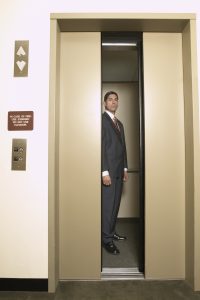Who is Liable for Injuries from Elevator Accidents in Condominiums?
 Elevators are a common feature in commercial and residential buildings. The housing boom of the last decade produced residential condominium complexes with state-of-the-art elevators that could transport many people to units around the complex quickly. Similarly, the housing bust of the last decade left in its aftermath condominium complexes with aging elevators and empty and unsellable units. Because maintenance fees are high, vital maintenance and repair of the common areas, including the elevator, is not occurring.
Elevators are a common feature in commercial and residential buildings. The housing boom of the last decade produced residential condominium complexes with state-of-the-art elevators that could transport many people to units around the complex quickly. Similarly, the housing bust of the last decade left in its aftermath condominium complexes with aging elevators and empty and unsellable units. Because maintenance fees are high, vital maintenance and repair of the common areas, including the elevator, is not occurring.
Condominiums
Condominiums are buildings containing a number of individually owned apartments or houses and shared common areas. The owners of the individual apartments buy their units and may have a mortgage, but they also pay a maintenance charge, usually monthly, for the upkeep and maintenance of the common areas of the condo.
ThyssenKrupp fined $375,000 Following Elevator Accident Injury
A court in Ontario, Canada assessed a $375,000 fine against an elevator manufacturing company because it failed to address a maintenance problem after various written and oral requests from the property manager of a condominium complex after the elevator caused serious injury to a man.
The underlying facts of the accident are as follows. An elevator in a condominium plunged as a man stepped inside it, trapping his foot and causing serious injury to his ankle. The man avoided an even greater injury because he was helped by bystanders in the elevator.
Investigators determined that the accident was caused by a faulty worn main drive sheave – the part that holds the elevator in place. While ThyssenKrupp denied liability, evidence presented at trial showed the elevator manufacturer failed to repair the problem after one of its mechanics and the building manager placed written and verbal maintenance requests.
The Public Should Be Able to Ride an Elevator without Fear of Serious Injury or Death
As the judge in the Canadian case mentioned, riding an elevator is commonplace and riders should enter without fear of being hurt or plunging to their deaths. The duty to repair and keep elevators in good working condition is usually overseen by the department of buildings. Condo owners, who hire a property manager to manage the common areas of the community, are responsible for upkeep and maintenance and therefore liable for elevator accidents if they were aware of a defect and did not take necessary action to repair it or notify riders of a problem.
Injured in an Elevator Accident?
The law firm of Cash, Krugler & Fredericks represents victims of serious injuries because of the negligence or intentional misconduct of others. When the injuries lead to the death of a loved one, family members may pursue wrongful death actions in addition to the survivor suit. Specializing in auto and trucking accidents, spinal cord injuries, elevator and escalator accidents, brain injuries, medical malpractice, defective products, and premise liability matters, contact Cash Krugler & Fredericks to schedule a comprehensive review of your claim or call us at (404) 659-1710.
See Related Posts:

